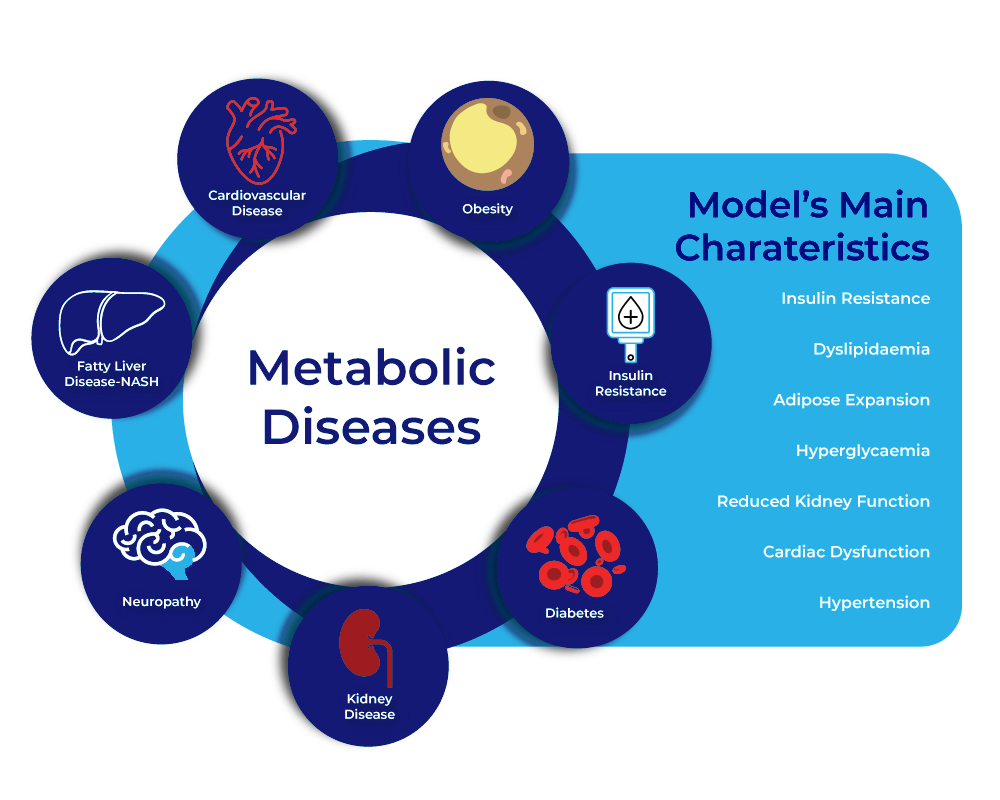Metabolic Models
Metabolic diseases represent a group of disorders that share a common feature which is disruptions in normal metabolic pathways.
Sygnature Discovery scientists have been at the forefront of drug discovery in the metabolic area for almost 20 years. From the discovery and registration of Sibutramine to Empagliflozin, our scientists are uniquely positioned to advance drug development for the treatment of metabolic diseases.
Our Comprehensive Metabolic Disease Models
Understanding the underlying mechanisms of metabolic diseases is critical for developing effective treatments and preventative strategies.
Sygnature Discovery provides integrated offerings from target identification, through molecule design and characterisation to in vitro and in vivo metabolic model modelling.
Our in vivo metabolic models help researchers to study the progression of diseases, their underlying pathophysiology, and the response to diverse interventions in a controlled setting. We offer a wide range of metabolic disease models, ranging from genetically modified models to those induced chemically or through dietary manipulation.
In vivo models – therapeutic indications:
| Therapeutic Indication | Models |
| Obesity | DIO mouse and rat model,Zucker rat modelob/ob mouse model |
| Insulin resistance | Glucocorticoid-induced insulin resistance rat model,DIO mouse and rat model,ob/ob mouse model |
| Diabetes | STZ/HFD mouse and rat model,db/db mouse model,ZDF rat model,ZSF-1 rat model |
| Kidney Disease | STZ/HFD mouse and rat model,ZSF-1 rat model,adriamycin mouse model,anti-GBM mouse and rat modelLPS rat and mouse model |
| Neuropathy | STZ/HFD mouse and rat model,db/db mouse model,ZDF rat model,ZSF-1 rat model |
| Fatty Liver Disease NASH | Choline deficient (CD) mouse model,H-FFC mouse model,H-FFC ob/ob mouse model,H-FFC CCl4 mouse model |
| Cardiovascular Disease | ZSF-1 rat model,adriamycin mouse model |

Key strengths of Metabolic Models:
- Closely mimic human disease conditions
- Offer controlled environment
- Allow investigation of multiple organs and systems
- Allow mechanistic study
- Enable synchronised PD and PK
State-of-the-art facilities and cutting-edge technology provide us with the ability to identify and optimise compounds with superior efficacy and safety profiles. Sygnature Discovery’s collaborative approach allows us to work closely with our customers to deliver tailored solutions that meet their specific drug discovery needs.
Our Metabolic Diseases Services
Sygnature Discovery’s in vivo metabolic offering involves using validated animal models to screen and identify novel therapeutic targets and drug candidates for metabolic disorders. We couple our robust in vivo models with metabolic profiling and services including molecular, biochemical and histological marker characterisation as well as a range of ex vivo platforms.
Metabolic profiling:
- Body weight
- Body temperature
- Water intake
- Food intake
- Energy expenditure
- Acute and chronic feeding studies
- Behavioural specificity
- Energy expenditure (16-cage TSE PhenoMaster)
- Glucose and insulin tolerance (OGTT, ITT)
- Body composition analysis (chemical analysis, DEXA, FoodScan)
- Energy content by bomb calorimetry (faeces/carcasses)
- Faecal fat analysis
- Measures of gastric emptying
- Blood pressure
- Glomerular filtration rate (creatinine and inulin)
- Urine collection in metabolic cages
- Thermal pain sensitivity (Hargreaves test)
- Mechanical allodynia (von Frey test)
Blood and plasma biochemistry
- Plasma ALT, AST, glucose, insulin, C-peptide, adiponectin, leptin, triglycerides, cholesterol, NEFA, bile acids, hyaluronic acid, ketone bodies
- TIMP-1 and PIIINP
- HbA1c, urea
- Urinary glucose, NGAL, MCP-1, protein
- Cytokines, chemokines
Tissue analysis
- qPCR such as proinflammatory, profibrotic and diseases specific panels
- MSD/ELISA such as proinflammatory and disease-specific panels
- Liver parameters such as triglyceride, cholesterol, NEFA, collagen
- Pancreatic insulin content
- Kidney and heart parameters such as triglyceride, collagen, cytokines
- Fat parameters such as triglyceride
Histology
- Morphology such as PAS, H&E
- Inflammation such as F4/80, CD45
- Fibrosis such as PS, MT
Ex vivo techniques
- Precision-cut kidney slices
- Ex vivo binding
Data pack and report
We can provide a fully audited data pack and a written report to regulatory standards if required.
